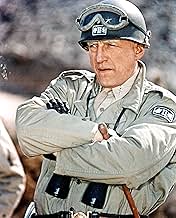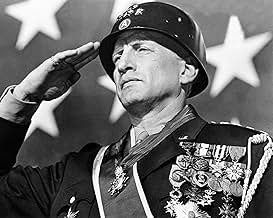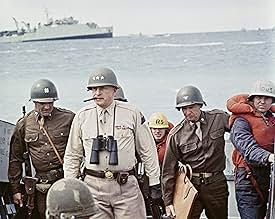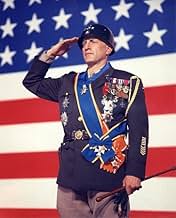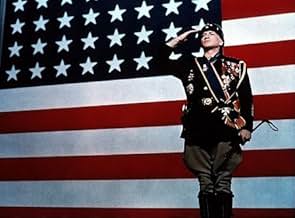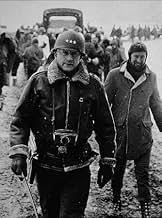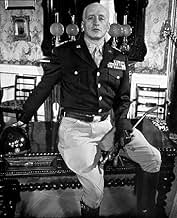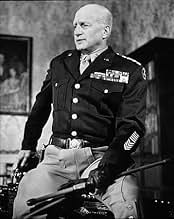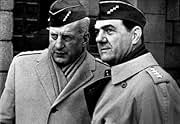Violento, vanitoso e fanatico fino a sfiorare il ridicolo, Patton è un uomo senza macchia e senza paura, una figura indimenticabile che mise a soqquadro l'esercito e che con la sua ossession... Leggi tuttoViolento, vanitoso e fanatico fino a sfiorare il ridicolo, Patton è un uomo senza macchia e senza paura, una figura indimenticabile che mise a soqquadro l'esercito e che con la sua ossessione per la disciplina creò uno degli incidenti più discussi della 2° guerra mondiale.Violento, vanitoso e fanatico fino a sfiorare il ridicolo, Patton è un uomo senza macchia e senza paura, una figura indimenticabile che mise a soqquadro l'esercito e che con la sua ossessione per la disciplina creò uno degli incidenti più discussi della 2° guerra mondiale.
- Regia
- Sceneggiatura
- Star
- Vincitore di 7 Oscar
- 25 vittorie e 8 candidature totali
- General Bradley's Driver
- (as Cary Loftin)
- First Lieutenant Alexander Stiller
- (as Patrick J. Zurica)
- Colonel General Alfred Jodl
- (as Richard Muench)
Riepilogo
Recensioni in evidenza
And that is why Patton works - you have an unambiguous war against and unambiguous evil - Nazi Germany. Whereas Vietnam might have been a tough conflict for even its supporters to explain, World War Two was quite simple - we were the good guys, and they WERE the bad guys. And so you COULD root for the US Army and Patton without feeling a tinge of guilt.
Also superb in the film is everyman Karl Malden as General Omar Bradley, providing the stable and workmanlike leader (and one who rises quicker in the ranks due to it) to Patton's egomaniac.
And Yes, George C. Scott delivers a career-defining performance that is one for the books. Could Brando or Telly Savalas have pulled off the role as well? I don't think so - it was just tailor made for Scott.
Patton was a man who lived for war. World War II was the high point and culmination of his life. He didn't fight for any principles, he didn't fight to defend freedom or democracy or any abstract idea; he fought because he loved fighting. In his diaries you can read of his fear of flunking out of West Point; the prospect terrified him because he was certain that he would never be good at anything except being a general or a leader of a country.
As a leader of men, he was exceptional. His speech at the beginning of the movie is vintage Patton, an almost exact reproduction of a speech Patton actually gave to Third Army. It's tough, and no-nonsense; Patton lets you know in no uncertain terms that he is here to win, to destroy the enemy, and by God you'd better be too. I don't know if Patton actually directed traffic on the roads as he is shown doing in the movie, but it was a very Pattonish thing to do. Patton did on at least one occasion get out of his staff car and join a squad of G.I.'s in heaving a vehicle out of the mud. Try to imagine Montgomery doing that; the very thought is hilarious!
Patton's character explains his treatment of his men. To those who had been wounded fighting for him he was always kind and considerate. But to those whose minds could not stand the horrible strain that war imposed on them, he was merciless; he could not comprehend the fact that other people didn't share his love of violence for violence' sake. PATTON shows this aspect of his character very well.
Karl Malden's Omar Bradley is shown in an almost father-like role; he sees and recognizes Patton's immense talents as a general, and uses them in spite of Patton's natural ability to antagonize everybody around him. Not shown in the movie is Patton's unloveable characteristic of turning on his subordinates once they surpassed him in their careers. Patton had nothing but good to say about Bradley, until Bradley was promoted over Patton's head, whereupon Patton savaged Bradley in his diary. Patton did the same to Eisenhower.
A general can have no higher compliment than the fear and respect of his adversaries, and as PATTON demonstrates, Patton was more feared by the Germans than any other Allied general, at least on the Western front. As one German officer observes all too prophetically, "the absence of war will destroy him [Patton]." And although mankind's single greatest stroke of good fortune in the 20th century was that Russia and America never came to blows, it is still hard not to feel sorry for Patton as he desperately seeks his superiors' approval to carry the war on eastward into the Soviet Union - anything, just to have a war to fight. Patton is like an addict to a destructive drug.
Hollywood has rarely given us such a textured and human portrait of a great man: cruel, often foolish in his relations with others, rude, and psychopathically attached to violence, but brave, dedicated, and loyal. Certainly those who, like myself, have Jewish blood, or who were otherwise marked for death by the Nazi state, all owe him a great debt of gratitude for his pivotal role in destroying that state. And yet, had he been born German, Patton would surely have fought just as devotedly for the Nazi side. I'm glad he wasn't.
Rating: **** out of ****.
George C. Scott's performance of Patton is one I consider the greatest given of any war film. Patton is a champion for freedom while sometimes equally as much of a tyrant as the ones he's trying to put down, he's a monster and a hero, and neither he nor the filmmakers give a damn about political correctness. I found the character to be an overly harsh prick, myself, but in some strange way, very likeable and sympathetic, and when watching the movie again I don't look at the screen and say, `Hey, there's George C. Scott.' Instead it's, `Hey, there's Patton.' Not very many film characters have a personality strong enough to overtake the actor playing them. I appreciate that depth and that degree of realism, this attention to detail on the parts of Scott and Schaffner.
Schaffner surprised me by somehow managing to capture my interest on a subject matter I'd ordinarily write off as too silly (Planet of the Apes); two years later, he applied that same technical know how, craft, and intelligent storytelling towards a film whose subject appeals to me from the get go, and once again I'm impressed. There are some great war films out today; however, Schaffner's take pursued the most unique perspective in all realms, and captured my imagination with such ease . . . I can't help but come back to it over other war films.
And I have to comment on the score, which is not only one of my favorite Goldsmith scores but also one of my favorite war-film scores. Jerry Goldsmith matched point for point the brilliance of Franklin Schaffner's vision, the depth of George C. Scott's performance, and somehow managed to captured the essence of both musically. A good music score is one that tells the story of the film in its own unique voice. Goldsmith's score has such a prominent voice in the experience of Patton, that to remove it would be the equivalent of removing Schaffner's direction or George C. Scott.
Lastly, how accurate is the film? Not a clue, and even if it is completely false, I don't care. I've never been about writing history papers based on cinema experiences. All I know for certain is that Patton is a very entertaining and well balanced movie that holds up very well thirty years later, and it's a film that can be admired for its craft.
Oscars Best Picture Winners, Ranked
Oscars Best Picture Winners, Ranked
Lo sapevi?
- QuizThe movie begins without showing the 20th Century-Fox logo, or any other indication that the film is starting. At military bases across the US theater owners reported that soldiers in the audience would often stand up and snap to attention when they heard the movie's opening line ("Ten-hut!"), assuming it to be a real call to attention.
- BlooperContrary to the way it's portrayed in the film, the controversy over George S. Patton's Knutsford speech was not over his having insulted the Russians (in fact, the Army quickly revised the initial transcript of his remarks to reflect that he had mentioned them). It had to do with his talk of "ruling the world" after the war - members of Congress said he had no business as a general commenting on post-war political affairs, while others objected to the notion of the US, Britain or anyone else "ruling the world."
- Curiosità sui creditiOne of the very, very few Twentieth Century-Fox films in which that company's logo is not shown at all, beginning or end. The film simply begins with the opening speech, and the opening Fox logo is replaced with an in-credit text-only notice after the speech. However, recent television showings have added the logo (not on DVD prints), and the addition is obviously spliced in from another piece of film.
- Versioni alternativeThe Italian version is approximately 20 minutes shorter and removes all scenes set in the German Military HQ and/or showing German officers: although the credits still include the names of German performers, like Karl Michael Vogler as Marshall Rommel, their characters never appear onscreen in the Italian release.
- ConnessioniEdited into Un uomo d'azione (1972)
- Colonne sonoreTo the Colors
(uncredited)
Traditional bugle call used in lieu of the National Anthem. Played at the opening scene.
I più visti
Dettagli
- Data di uscita
- Paese di origine
- Sito ufficiale
- Lingue
- Celebre anche come
- Patton
- Luoghi delle riprese
- Cabo de Gata, Almería, Andalucía, Spagna(desert scenes)
- Azienda produttrice
- Vedi altri crediti dell’azienda su IMDbPro
Botteghino
- Budget
- 12.000.000 USD (previsto)
- Lordo Stati Uniti e Canada
- 61.749.765 USD
- Lordo in tutto il mondo
- 61.749.765 USD
- Tempo di esecuzione
- 2h 52min(172 min)
- Colore
- Proporzioni
- 2.20 : 1



